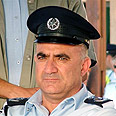
"In the military sphere, Israel's might has increased, but there are factors eroding the country's civilian strength, including a weakening of the rule of law, and the legitimacy given to certain spheres of crime such as light drugs, traffic offences, financial violations of the law, and even violent offences," Karadi said.
"There are worrying trends such as organized crime, which are creating an exterritorial threat with violations of the law. Teenagers are also involved in crime organizations," Karadi warned.
"Today, a police investigator has to deal with 280 cases. Many of the criminals who are supposed to be behind bars are not under arrest. An officer on duty at 2 a.m. at the (southern town of) Dimona police station has to decide who will remain under arrest – someone who beat his wife, or someone who robbed a food stand," the police chief said.
Karadi also cited delays in processing cases, saying: "In 2005, we transferred 97,000 cases to the prosecution, and today there are 148,000 cases to deal with. Not to mention the delay over the 11,000 cases involving people under arrest until the end of legal procedures."
State Ccmptroller: We need drastic change
State Comptroller Micha Lindenstrauss, who also spoke at the Herzliya forum, said that "if Israeli society wants to be clean and pure, it must see things as they are. Things cannot go on as they are today."
The comptroller also discussed delays in applying the government's decision to bolster the protection offered to Gaza-area Israeli communities.
"Yesterday, we submitted a report on protecting these communities, based on findings by 21 investigators. The issue is important to us because it must be done in real time, so that we can change things in real time. Criticism must be open and transparent with publication of names, which is the most effective way of dealing with those criticized. Criticism that sees the need to uproot the issue of corruption from the public is at the center of our work at the Comptroller's Office."
Knesset Member Michael Eitan (Likud) said that politicians should not be the sole targets of blame for failure to uphold the law.
"Where are the law enforcers?" he asked.
Earlier, former broadcaster-turned-Labor-politician Shelly Yechimovitz warned of corruption in politics.
"There is a major confusion here between criminal guilt and public corruption. If someone hasn't been tried, that doesn't mean they are not publicly corrupt," she said.
Yechimovitz added that "these people want a weak police and a weak prosecution, (because) this serves them. There is an impression that there isn't really a will to deal with corruption. The impression is that we are asking politicians to bring in the goods, and we (in exchange) will forget about their corruption."















